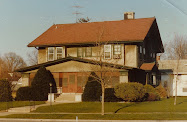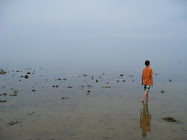I wrote this a few years ago. Today is the seventeenth anniversary of my father's death.
The journey began simply, with a round of Go Fish. I was playing cards with my eight-year old daughter while her younger brothers paraded around the living room to Souza marches, wooden spoons in hand serving variously as batons, trombones, flutes and drumsticks. As the boys circled the sofa, we played our game. It progressed quickly; the cards had been poorly shuffled from the last game and she won. She leapt up to join the parade, leaving me to shuffle and put the cards away. I watched them march happily as I shuffled the deck and, without thinking, laid out a row of seven cards in front of me.
As I dealt the cards for solitaire, in my mind the cotton tablecloth turned to smooth polished cherry, the track lighting to a china lamp on my left and our dining room to a corner of the living room in our family house in St. Louis. Across from me I saw my father, playing his own hand of solitaire, deftly, seriously, quickly. It was the early 1980s and in those days we played double solitaire endlessly. He would play with anyone who was willing and as we sat in the delicate but sturdy cane chairs that my mother painted with pastel flowers on a black background before she married, the hours and the cards flew.
The games were fast-paced and good-natured but there was a frenetic quality to them.
It was the closest thing to exercise I ever saw Dad engage in (we used to howl at his morning calisthenics, which consisted of making tiny circles with outstretched arms and toe-touching that somehow never involved actually bending over). But when my turn was over and I observed him playing with my Mother I saw that he wasn’t playing, he was working.
Mom said he was learning to think again and she was right. The old ways of thinking and doing had washed away in a flood of booze, and now that the tide had receded he was repairing the damage, repaving the mottled roads in his brain. Decks of cards and stacks of encyclopedias and dictionaries crowded his side of the table and the library table behind the winged back where he spent his afternoons. When he wasn’t playing cards he was completing crossword puzzles, one right after the other. That’s how he filled his days during those early years of their retirement. He was learning to live again and he did it one puzzle, one game at a time. We bought new decks of cards when the old ones wore out and kept him supplied with crosswords and new, more specialized dictionaries for finding the right words: rhyming dictionaries, medical dictionaries, crossword dictionaries, thesauruses.
In time he turned his attention away from the cards (the puzzles remained, always) and began watching more television, which seemed like a step backward at first. He watched Wheel of Fortune and the Price is Right, Lawrence Welk and Hee Haw, and then, gradually, The Cookin’ Cajun and The French Chef. I had moved away by then and when I came to visit, it was he and not my mother who made dinner and traded recipes with me. The man who, throughout my childhood, hated onions and ate canned pears with cottage cheese every night was cooking with garlic, fresh thyme and sesame seeds. Hershey bars smeared with butter (no kidding) gave way to sorbet, oysters on the half shell and homemade soup. After almost 40 years of cooking my mother was thrilled to turn the kitchen over to him, and he gave me my first serious cookbook, Craig Claiborne’s New York Times Cookbook. It’s out of print now.
But those card-playing days started it all. They were his entry back into the family after years of physical and emotional absence. Typical of his generation, there was no twelve step process or open acknowledgement of alcoholism. Instead there was a new, carefully constructed companionship: rides in the car, casual meals out, shared books on history, stories told of World War II and a life lived mostly in small town Iowa. There was reading, punctuated by snoring, before the well-tended fire. And with his grandchildren he renewed the sweet rituals of our childhood with trips to the five and dime for treats and baseball cards, and long babies’ naps on his ample lap. Through all of the years he never lost his gift for calming babies.
Who is to say what makes someone withdraw for years at a time and then suddenly awaken? Watching him is as close a look as I’ve ever gotten to the door between this world and the one where depression stifles every impulse to live and connect. I sense it sometimes, the numbing sensation that makes me want to bury myself in the newspaper instead of tend to the responsibilities of daily life. That feeling of being wholly unequal whatever task life presents, however simple and achievable it may be, it is almost impossible to stop the sense of inner implosion once it has begun. Sometimes it takes an hour to ride it out, sometimes a day, sometimes a month. Only when I have emerged on the other side can I see where I’ve been and try to decipher what it was that brought me back into the light.
I observe Our Boy with autism and I cannot help but wonder if my father is lurking in the foggy netherworld that sometimes envelopes him. He inhabits both worlds at the same time and is somehow at home and a foreigner to each one in a single moment. I know that science will never draw a line between alcoholism and autism, but I cannot help thinking there is something about filling an inner void that characterizes them both. There are moments when I look into Our Boy's eyes and see my father looking back at me, hurt, bewildered, obstinate. To see Our Boy is to view human emotion distilled down to the essence, he knows the purest joy, the greatest sadness, the deepest confusion, the wildest rage, and all of them change as swiftly as the New England weather. There isn't any meanness and guile, though there is selfishness and manipulation, and this was so true of my father too. He wanted to achieve but he only really knew how to give and as a result he gave away most of what he had, and then some. It was only when his body began to break and the expectations were gone that he found the opportunity to seek and out and be who he was. I think that is what we will have to do for Our Boy – create for him the world where he can be. Ironically, perhaps, autism will give him that freedom, for no one expects him to be any more than he is, though we will fight his oblivion every day so that he can be free to communicate his needs to the world in hopes that they might be met.
We can try to give Our Boy what I could not give my father and what he was incapable of asking for. He wanted only to get along and be loved by those he loved, and in 20th century America that wasn’t enough. The rags-to-riches American dream eluded him, but he loved and was loved in the way that only the impenetrable Irish male can. His body and his brain succumbed to addiction and depression and when the physical pain cut through the numbness – when it was more painful to be drunk than sober - he dug his way out and started over. And lucky for him there were people there to meet him on the other side and play cards with him. When Our Boy is ready to play I will be at the table, waiting.
23 July 2009
Subscribe to:
Post Comments (Atom)



No comments:
Post a Comment